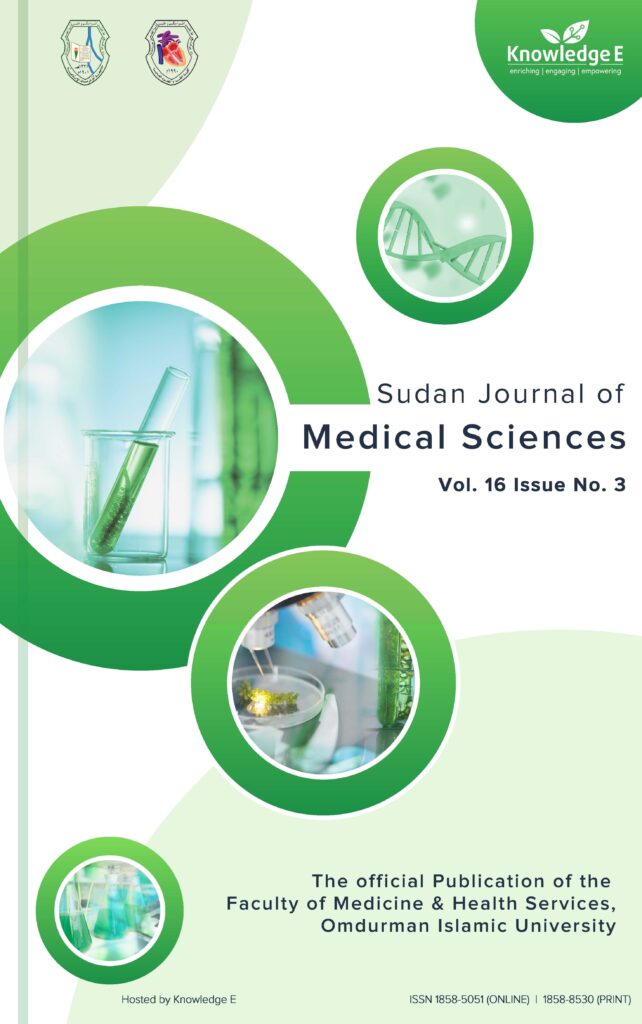
Sudan Journal of Medical Sciences
ISSN: 1858-5051
High-impact research on the latest developments in medicine and healthcare across MENA and Africa
Determinants of Job Satisfaction and Retention Among Medical Laboratory Professionals in Somalia
Published date:Mar 28 2025
Journal Title: Sudan Journal of Medical Sciences
Issue title: Sudan JMS: Volume 20 (2025), Issue No. 1
Pages:72 - 80
Authors:
Abstract:
Background: Job satisfaction among laboratory professionals is critical to healthcare quality and workforce retention in Somalia. Understanding job satisfaction factors is crucial for implementing targeted interventions to improve healthcare services. This study aimed to determine the factors influencing job satisfaction and retention among medical laboratory technologists in Somalia.
Methods: A descriptive cross-sectional study involving laboratory professionals in Mogadishu was conducted between October 2023 and March 2024. Structured questionnaires were used to gather the data. We used descriptive and logistic regression, such as binary and multivariate logistic regression, to identify the factors affecting job satisfaction. P-values <0.05 were considered significant.
Results: This study revealed a range of job satisfaction levels, with 43.3% of respondents dissatisfied and 56.7% satisfied. Significant factors influencing job satisfaction included gender (AOR = 2.054, 95% CI: 1.095–3.855, P = 0.025), education level (AOR = 3.086, 95% CI: 0.607–15.699, P = 0.036), years of experience (AOR = 5.894, 95% CI: 1.618–21.475, P = 0.001), facility level (AOR = 0.692, 95% CI: 0.364– 1.316, P = 0.041), professional development (AOR = 2.374, 95% CI: 1.467–3.842, P = 0.003), management appreciation (AOR = 1.699, 95% CI: 1.011–2.855, P = 0.045), and vacation time (AOR = 1.972, 95% CI: 1.165–3.192, P = 0.011).
Conclusion: This study’s results underscore the need for targeted interventions to address job dissatisfaction among laboratory professionals in Somalia. Recommendations include implementing gender-sensitive policies to promote equality, enhancing professional development programs to foster career growth, and improving management recognition and support to create a more conducive work environment and boost job satisfaction.
Keywords: job satisfaction, laboratory professionals, Somalia, healthcare workforce, work environment
References:
[1] Plebani, M., Laposata, M., & Lippi, G. (2019). A manifesto for the future of laboratory medicine professionals. Clinica Chimica Acta, 489, 49–52. https://doi.org/10.1016/j.cca.2018.11.021
[2] Sikaris, K. A. (2017). Enhancing the clinical value of medical laboratory testing. The Clinical Biochemist. Reviews / Australian Association of Clinical Biochemists, 38(3), 107–114.
[3] Said, A. S., & Kicha, D. I. (2024). Implementing health system and the new federalism in Somalia: Challenges and opportunities. Front Public Health, 12(1). https://doi.org/10.3389/fpubh.2024.1205327
[4] Mesfin, E. A., Taye, B., Belay, G., Ashenafi, A., & Girma, V. (2017). Factors affecting quality of laboratory services in public and private health facilities in Addis Ababa, Ethiopia. EJIFCC, 28(3), 205–223. http://www.ncbi.nlm.nih.gov/pubmed/ 29075171%0Ahttp://www.pubmedcentral.nih.gov/ articlerender.fcgi?artid=PMC5655637
[5] Jaeger, F. N., Bechir, M., Harouna, M., Moto, D. D., & Utzinger, J. (2018). Challenges and opportunities for healthcare workers in a rural district of Chad. BMC Health Services Research,18(1), 7. https://doi.org/10. 1186/s12913-017-2799-6
[6] Marinucci, F., Majigo, M., Wattleworth, M., Paterniti, A. D., Hossain, M. B., & Redfield, R. (2013). Factors affecting job satisfaction and retention of medical laboratory professionals in seven countries of Sub- Saharan Africa. Human Resources for Health, 11(1), 38. https://doi.org/10.1186/1478-4491-11-38
[7] Mosadeghrad, A. M. (2014). Factors influencing healthcare service quality. International Journal of Health Policy and Management, 3(2), 77–89. https: //doi.org/10.15171/ijhpm.2014.65
[8] Cortelyou-Ward, K., Ramirez, B., & Rotarius, T. (2011). The laboratory workforce shortage: A managerial perspective. The Health Care Manager, 30(2), 148– 155. https://doi.org/10.1097/HCM.0b013e318216f5df
[9] Duah, E., Amoah, S., Addy, N. A., & Ephraim, R. K. (2022). Factors affecting job satisfaction and retention of Medical Laboratory Professionals in Ghana. African Journal of Management Research, 29(1), 2–24.
[10] Burr, H., Berthelsen, H., Moncada, S., Nübling, M., Dupret, E., Demiral, Y., Oudyk, J., Kristensen, T. S., Llorens, C., Navarro, A., Lincke, H. J., Bocéréan, C., Sahan, C., Smith, P., Pohrt, A., & the international COPSOQ Network. (2019). The Third Version of the Copenhagen Psychosocial Questionnaire. Safety and Health at Work, 10(4), 482–503. https://doi.org/ 10.1016/j.shaw.2019.10.002
[11] Basnet, B. B., Satyal, D., Pandit, R., Maharjan, A., Karki, R., Mishra, S. K., Gc, S., & Basnet, T. B. (2022). Medical laboratory staff satisfaction and their perspective on the role of health institutions to combat COVID-19 pandemic. The Journal of International Medical Research,50(6), 3000605221105356. https: //doi.org/10.1177/03000605221105356
[12] Liu, D., Wu, Y., Jiang, F., Wang, M., Liu, Y., & Tang, Y. L. (2021). Gender differences in job satisfaction and work-life balance among Chinese physicians in tertiary public hospitals. Frontiers in Public Health, 9(May), 635260. https://doi.org/10.3389/fpubh.2021. 635260
[13] Miao, Y., Li, L., & Bian, Y. (2017). Gender differences in job quality and job satisfaction among doctors in rural western China. BMC Health Services Research, 17(1), 848. https://doi.org/10.1186/s12913-017-2786-y
[14] Temesgen, K., Aycheh, M. W., & Leshargie, C. T. (2018). Job satisfaction and associated factors among health professionals working at Western Amhara Region, Ethiopia. Health and Quality of Life Outcomes, 16(1), 65. https://doi.org/10.1186/s12955- 018-0898-7
[15] Inayat, W., & Jahanzeb Khan, M. (2021). A study of job satisfaction and its effect on the performance of employees working in private sector organizations, Peshawar. Education Research International. https://doi.org/10.1155/2021/1751495
[16] Shiri, R., El-Metwally, A., Sallinen, M., Pöyry, M., Härmä, M., & Toppinen-Tanner, S. (2023). The role of continuing professional training or development in maintaining current employment: A systematic review. Healthcare (Basel), 11(21), 1–17. https://doi. org/10.3390/healthcare11212900
[17] Mere, R. A., Simbeni, T. V., Mathibe, M., Mogale, M. N., & Ntuli, S. T. (2023). Job satisfaction among health professionals in a District of North West province, South Africa. Health SA, 28(0), a2234. https://doi. org/10.4102/hsag.v28i0.2234
[18] Alahiane, L., Zaam, Y., Abouqal, R., & Belayachi, J. (2023). Factors associated with recognition at work among nurses and the impact of recognition at work on health-related quality of life, job satisfaction and psychological health: A single-centre, cross-sectional study in Morocco. BMJ Open, 13(5), e051933. https://doi.org/10.1136/ bmjopen-2021-051933
[19] Lo, J., Fayyaz, Y., Jaswal, S., Gohar, B., Yazdani, A., Chattu, V. K., & Nowrouzi-Kia, B. (2022). Factors associated with job satisfaction in medical laboratory professionals during the COVID-19 pandemic: An exploratory study in Ontario, Canada. European Journal of Investigation in Health, Psychology and Education, 13(1), 54–66. https://doi.org/10.3390/ ejihpe13010004